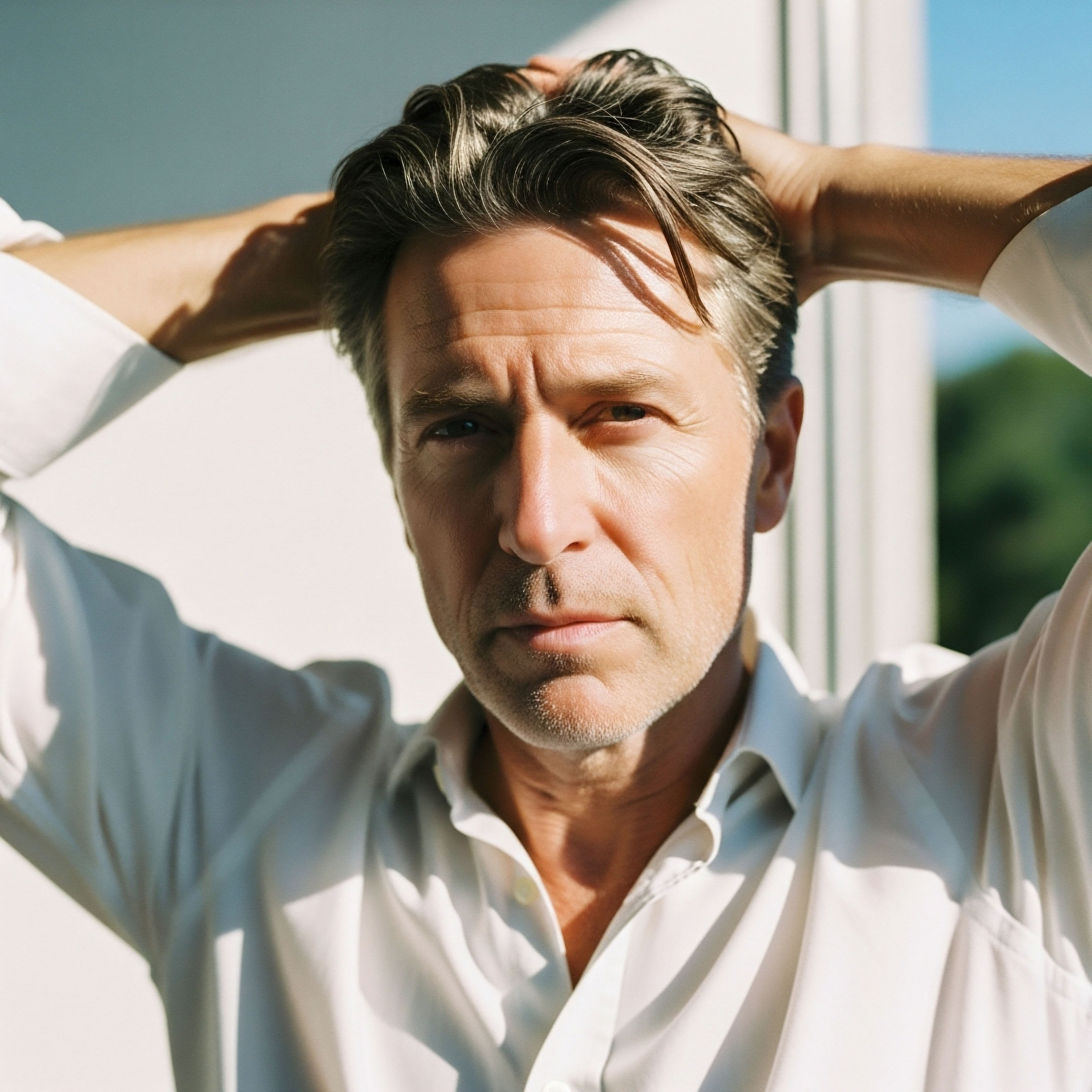

Your Biology Is Your Biography
The story of your life is written in your cells. Every surge of energy, every moment of clarity, and every ounce of strength you possess is a direct result of the complex chemical conversations happening within your body. You may have noticed a change in the narrative.
The energy that once defined your days now feels like a finite resource. Mental sharpness gives way to brain fog. The reflection in the mirror no longer matches the drive you feel inside. These are not just signs of aging; they are signals from your endocrine system that the biochemical script has been altered.
The hormones that once orchestrated your vitality are now performing out of sync, and the effects are tangible. They show up as stubborn body fat, diminished libido, and a general sense of being off your game.
Your future self is not a passive passenger in the aging process; they are the direct result of the hormonal decisions you make today.
This is where the concept of proactive wellness becomes your most powerful tool. Viewing your body as a high-performance system that can be tuned and optimized is the first step toward reclaiming your edge. Hormonal recalibration is about taking control of your biological narrative.
It involves understanding that declining hormone levels are not a life sentence but a performance blocker that can be addressed with precision. By restoring your hormonal balance, you are not just treating a deficiency; you are making a strategic investment in your future self. You are rewriting the story of your aging process from one of passive decline to one of active, intentional vitality.


Recalibrating Your Internal Engine
Think of your body’s endocrine system as the sophisticated engine of a high-performance vehicle. Hormones are the refined fuel and vital fluids that ensure every component operates at peak efficiency. Over time, this internal engine can fall out of tune. Levels of key hormones like testosterone and growth hormone decline, leading to a noticeable drop in performance. Hormone optimization protocols act as a precision tune-up for this system, recalibrating your body’s internal chemistry to restore power and efficiency.

The Blueprint for Biological Optimization
The process is methodical and data-driven, designed to bring your system back to its optimal state. It begins with a comprehensive analysis of your unique biological markers to identify specific hormonal imbalances. From there, a personalized protocol is designed to address these imbalances with targeted interventions.
This is not a one-size-fits-all approach but a tailored strategy to unlock your body’s full potential. The goal is to restore the precise chemical signaling that governs everything from muscle growth to cognitive function.

Key Protocols for Performance Enhancement
- Testosterone Replacement Therapy (TRT) ∞ This protocol directly addresses declining testosterone levels, a primary factor in age-related loss of muscle mass, energy, and libido. By restoring testosterone to optimal levels, TRT helps rebuild your body’s foundational strength and drive.
- Peptide Therapy ∞ Peptides are short chains of amino acids that act as precise signaling molecules in the body. Certain peptides can stimulate the body’s own production of growth hormone, which is essential for muscle repair, fat metabolism, and overall recovery. Think of them as software updates for your cells, instructing them to perform their functions more efficiently.


The Shift from Surviving to Thriving
The decision to pursue hormonal optimization is often triggered by a moment of recognition. It is the realization that you are spending too much time managing the signals of decline and not enough time living at your full potential. You might notice it in the gym, where your workouts no longer yield the same results.
It could be in the boardroom, where mental fatigue clouds your focus. Or it might be a simple, quiet feeling that the vitality you once took for granted has become a daily struggle. This is the point where proactive intervention becomes a necessity for those who refuse to accept a diminished version of themselves.
Hormone optimization is for the individual who understands that waiting for a problem to become critical is a flawed strategy.
The benefits of a recalibrated system unfold over time, creating a tangible shift in your daily experience. Within the first few weeks, you may notice an improvement in your energy levels and mood. Over the following months, the changes become more pronounced.
You could experience an increase in lean muscle mass, a reduction in body fat, and a renewed sense of mental clarity. Libido and sexual function often improve, and the nagging aches and pains associated with aging may begin to fade. This is the timeline of optimization, a progressive journey back to the peak performance you thought was a thing of the past.

Architecting Your Vitality
The power to define your aging process is in your hands. By viewing your body as a system that can be optimized, you move beyond the outdated narrative of inevitable decline. You become the architect of your own vitality, using the tools of modern science to build a future defined by strength, clarity, and purpose.
The question is not whether you will age, but how. Will you allow your biology to dictate your biography, or will you take control of the pen and write a new chapter?

Glossary

endocrine system

vitality

proactive wellness

muscle growth

trt




